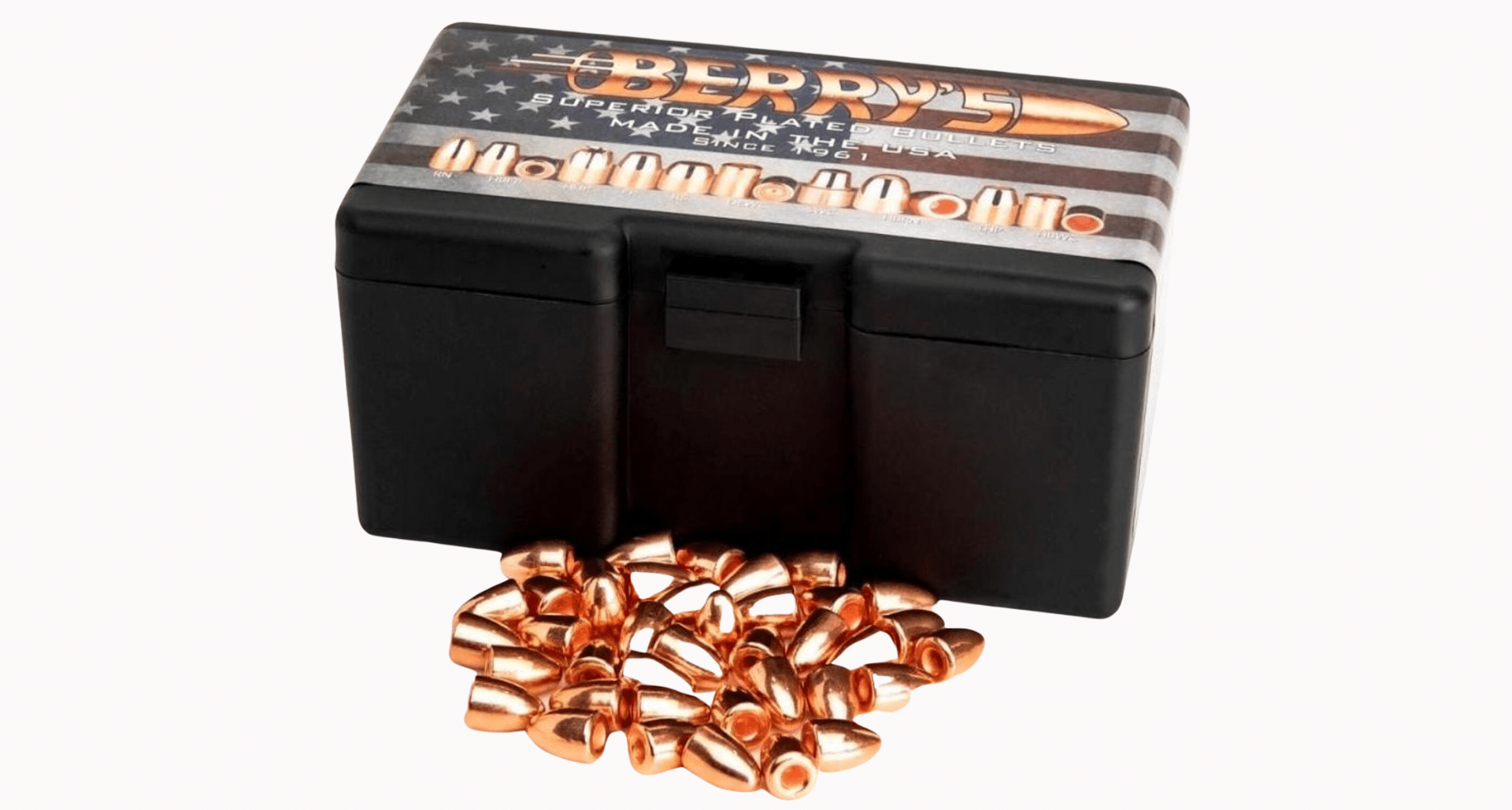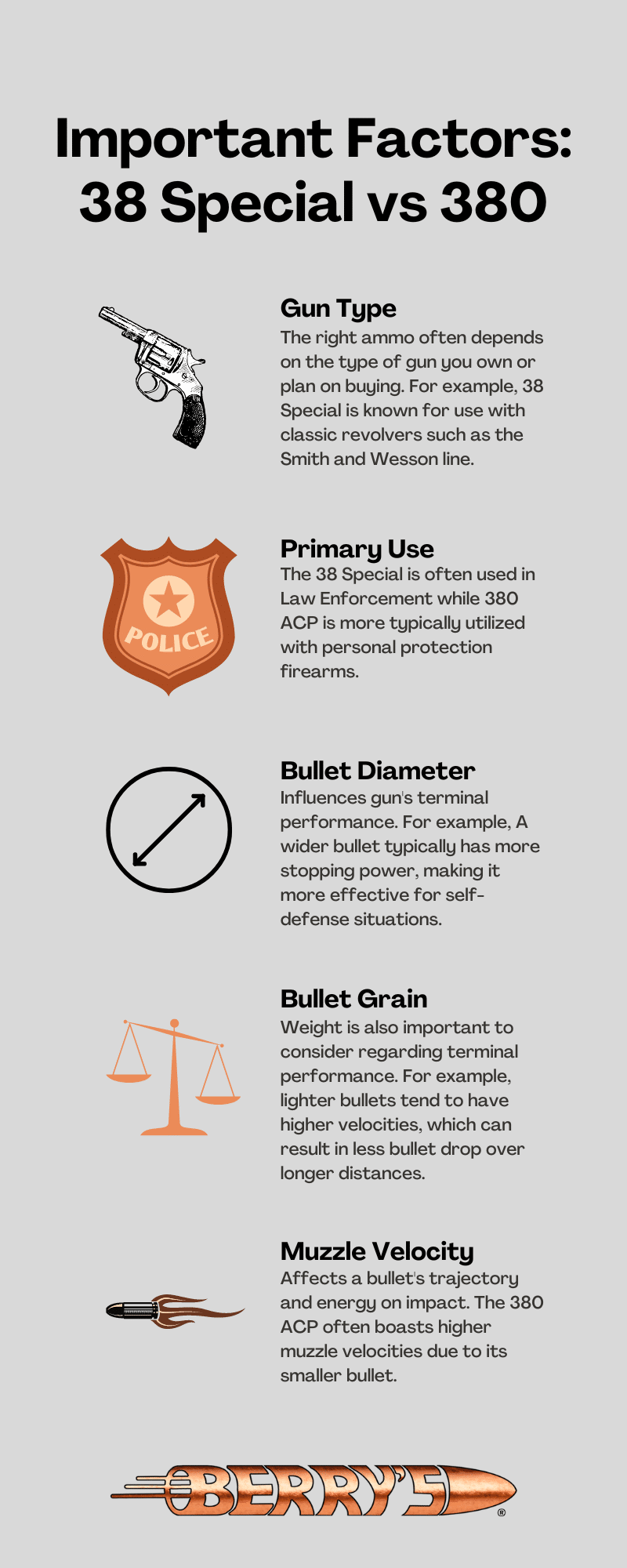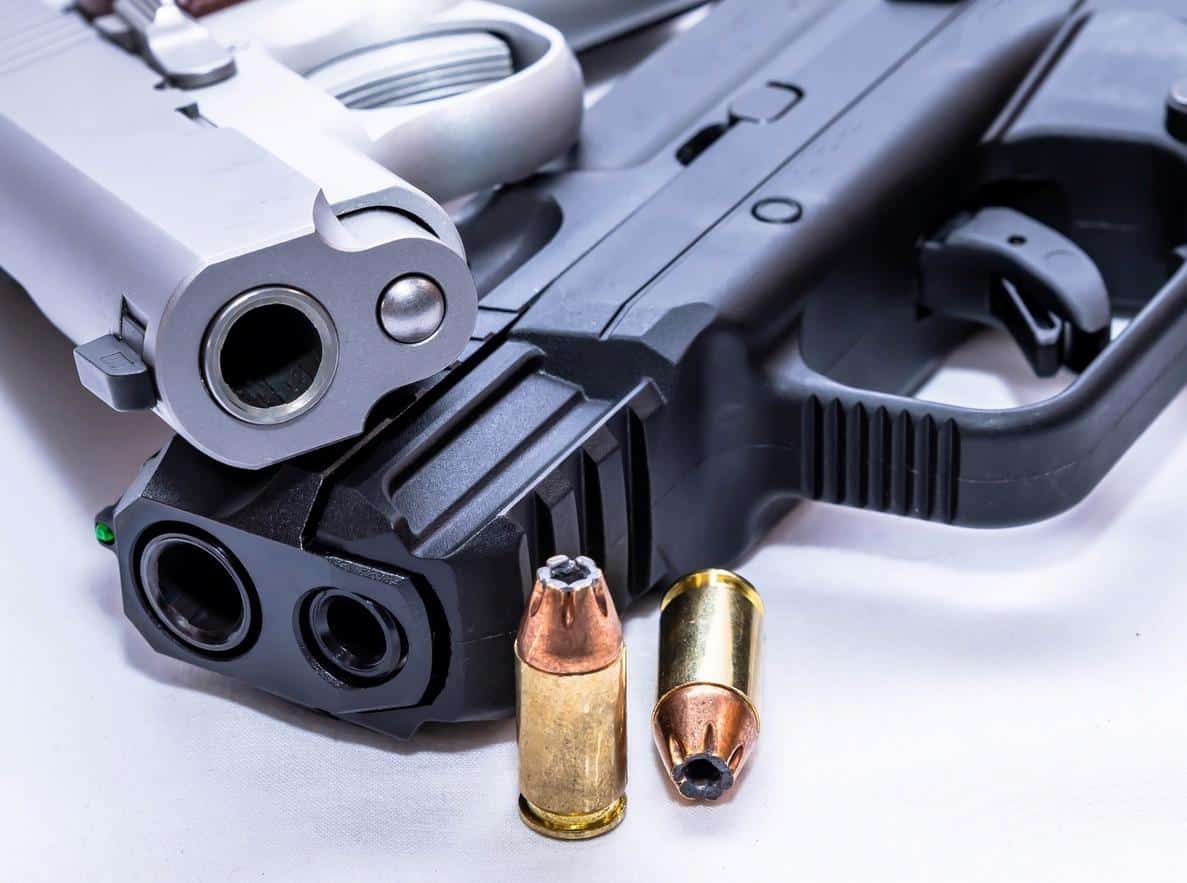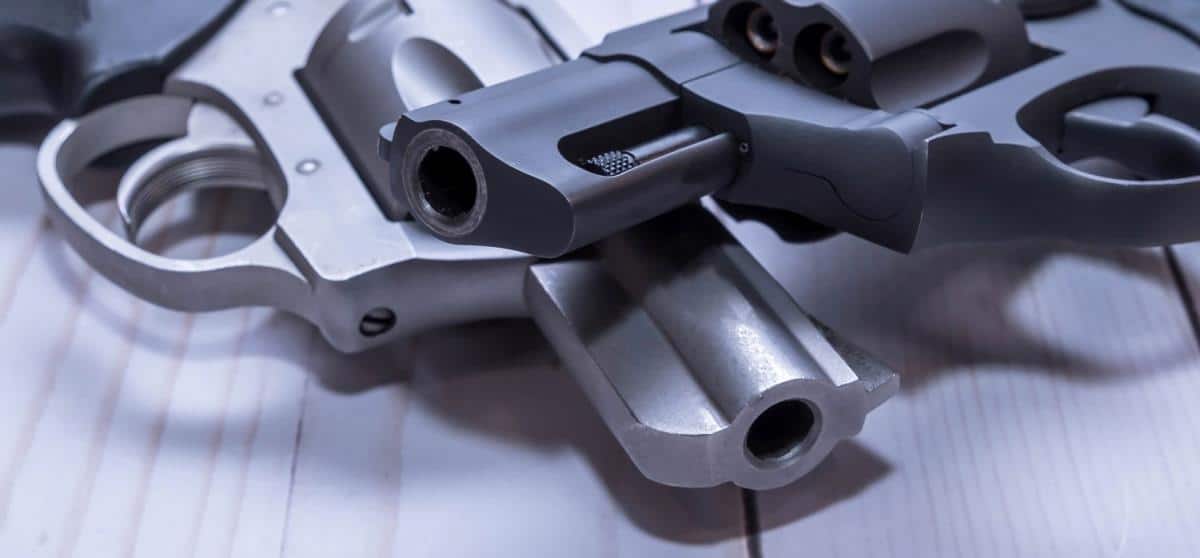Your cart is currently empty!

Caliber Comparison: .380 vs .38 Special
Welcome to our comprehensive guide on the differences between 380 ACP and 38 Special caliber pistols. Our decades of experience in the field make Berry’s Bullets the superior choice for all your shooting and reloading needs.
In this blog post, we aim to provide you with valuable insights into the nuances of two popular pistol calibers: the 380 ACP and the 38 Special. Whether you are a seasoned firearm enthusiast or a novice looking to make an informed decision, we have got you covered.
When it comes to personal protection, choosing the right firearm and caliber is of utmost importance. Both the 380 ACP and the 38 Special have a strong following, and each offers unique advantages that cater to different preferences and needs.
Our goal is to present you with a direct and informative analysis of these two calibers. We want to help you understand the differences in performance, terminal ballistics, and practical applications, allowing you to make an educated decision based on your requirements and intended use. Let’s begin our exploration of the 380 ACP and the 38 Special caliber pistols.
Caliber Terms to Know: ACP, Bullet Diameter, Bullet Grain, ACP Cartridge

Throughout this blog, we will refer to several key terms related to firearms and ammunition. “ACP” stands for Automatic Colt Pistol, which is commonly used to describe various semi-automatic pistol cartridges developed by Colt. Bullet diameter refers to the width of the projectile, typically measured in hundredths or thousandths of an inch. “Bullet grain” denotes the weight of the projectile, where one grain is equivalent to approximately 1/7000th of a pound.
Assuming that we have a solid foundation on the significance of caliber and bullet characteristics, let’s move on to explore the unique features of the 380 ACP and 38 Special cartridges in the subsequent sections.
Next, we’ll dive into the specifics of the 380 ACP, offering a comprehensive overview of its history, ballistics, and applications in the realm of self-defense and personal protection.
380 ACP Bullets: History
The 380 ACP, also known as 9mm Short or 9x17mm, is a popular semi-automatic pistol cartridge that has gained widespread recognition for its compact size and manageable recoil. Developed by John Moses Browning, the 380 ACP was introduced in 1908 for use in the Colt Model 1908 pocket hammerless semi-automatic pistol. Since then, it has found its way into numerous firearms, making it a popular choice for concealed carry and self-defense purposes.
The development of the 380 ACP was a direct response to the increasing demand for a cartridge that offered greater concealment and reduced recoil compared to larger pistols. John Moses Browning’s ingenuity led to the creation of this smaller but effective cartridge, which found favor among individuals seeking reliable and easily concealable handguns.

Popular Handguns Chambered in 380 ACP
Over the years, several firearm manufacturers have embraced the 380 ACP caliber, producing a wide array of semi-automatic pistols chambered for this cartridge. Notable models include the Ruger LCP, Walther PPK, and various offerings from Smith & Wesson, among others. These handguns have become popular choices for concealed carry enthusiasts and those seeking a reliable self-defense option.
Terminal Performance and Self-Defense Application
The 380 ACP cartridge is known for its practical application in self-defense scenarios. While it may not offer the same stopping power as larger calibers, its manageable recoil allows for faster follow-up shots, making it easier for shooters to place accurate shots on target.
Ballistic Gelatin Tests and Muzzle Energy
Ballistic gelatin tests are frequently used to evaluate the performance of a bullet in simulating human tissue. While the 380 ACP may not penetrate as deeply as larger calibers, it has proven to be effective in delivering adequate energy to incapacitate a threat. Muzzle energy, which refers to the kinetic energy of the bullet as it leaves the barrel, is an important factor in determining a cartridge’s stopping power. Understanding the capabilities and limitations of this caliber is crucial for making an informed decision regarding your personal protection needs.
38 Special Round: History & Law Enforcement
The 38 Special, often referred to simply as “38 Special” “38 Spl” or simply “S&W Special” is one of the most widely used revolver cartridges in the world. Introduced in 1898 by Smith & Wesson, this versatile caliber has enjoyed decades of popularity among law enforcement, target shooters, and concealed carry permit holders.
In the early 20th century, the 38 Special gained prominence as a popular choice for law enforcement agencies across the United States. Its relatively mild recoil and accurate performance made it well-suited for duty use. For many years, the 38 Special was the standard issue cartridge for police officers, and has thus become synonymous with police revolvers.

38 Special: Use in Revolvers and Semi-Auto Pistols
One of the unique aspects of the 38 Special is its compatibility with both revolvers and certain semi-automatic pistols. While primarily used in revolvers, some manufacturers have designed semi-automatic pistols to accommodate the 38 Special, offering shooters the convenience of using the same cartridge in different firearm platforms.
Performance Comparison: Accuracy, Muzzle Velocity, and Recoil
When pitting the 380 ACP against the 38 Special, several performance factors come into play. Accuracy is a critical consideration for any firearm, and both calibers have proven to be accurate within their effective ranges. However, the 38 Special’s larger bullet and longer case provide it with a slight advantage in terms of potential accuracy, especially in well-maintained revolvers known for their precise craftsmanship.
Importance of Choosing the Right Caliber
Selecting the right caliber is a critical decision, especially when it comes to personal protection and self-defense. Different calibers offer varying levels of stopping power, recoil, and terminal performance, and understanding these differences will aid you in making an informed choice.
The Impact of Bullet Diameter and Bullet Weight on Performance
Bullet diameter and weight directly influence a projectile’s terminal performance. A larger bullet typically has more stopping power and creates a larger wound channel upon impact, making it more effective for self-defense situations. On the other hand, lighter bullets tend to have higher velocities, which can result in flatter trajectories and less bullet drop over longer distances.
Muzzle Velocity
Muzzle velocity is another important aspect that affects a bullet’s trajectory and energy on impact. The 380 ACP often boasts higher muzzle velocities due to its smaller bullet and the inherent design characteristics of semi-automatic pistols. On the other hand, the 38 Special’s larger bullet diameter and longer case generally result in slightly lower muzzle velocities.
Recoil plays a crucial role in firearm shootability and the ability to deliver fast follow-up shots. The 380 ACP’s lower recoil makes it easier to control, especially for shooters with less experience or those sensitive to recoil. Conversely, the 38 Special’s larger bullet and higher energy generate more recoil, potentially impacting shot placement, especially in lightweight revolvers.
Self-Defense and Personal Protection Considerations
When it comes to self-defense and personal protection, both the 380 ACP and the 38 Special have proven track records. The 380 ACP’s lighter recoil and adequate stopping power make it a popular choice for concealed carry and personal defense. Its smaller size allows for the design of compact and easily concealable handguns.
On the other hand, the 38 Special’s long history of use by law enforcement and civilians alike demonstrates its effectiveness in self-defense scenarios. The cartridge’s larger bullet diameter, coupled with proper shot placement, can provide sufficient stopping power to halt a threat.
Comparing 38 Special vs 380 ACP Bullet Ballistics
When comparing the ballistics of the 38 Special and the 380 ACP, it’s essential to consider their differences in design and intended use. The 38 Special typically fires heavier bullets than the 380 ACP, resulting in higher muzzle energy and potential stopping power. However, it also generates more recoil compared to the 380 ACP, which might impact ease of firing for some individuals.
It’s important to remember that the choice between the 380 ACP and the 38 Special depends on various factors, some not qualifiable such as personal preferences, and some that are more easily classified such as intended use and individual shooting capabilities.
Popular Guns that Use 380 and 38 Spl: Ruger LCP and S&W Models
When considering specific firearm models, the Ruger LCP stands out as a popular and reliable choice chambered in 380 ACP. Its small size and lightweight design make it an excellent option for discreet carry, while still offering adequate firepower for self-defense situations.
As for the 38 Special, Smith & Wesson’s long line of revolvers, such as the classic Model 10 or the more modern Smith & Wesson Model 686, have earned a reputation for reliability and performance. These revolvers have served law enforcement and civilians for generations, solidifying the 38 Special’s place as a proven and trusted caliber for self-defense.
380 vs 38 Special: Wrap-Up
In summary, the 380 ACP and the 38 Special are two unique and versatile calibers that have earned their place in the world of firearms. The 380 ACP shines with its compact size, manageable recoil, and suitability for concealed carry, while the 38 Special boasts a long history of service and reliability, especially in law enforcement and personal defense.
Here at Berry’s, we offer a variety of 38 Special and 380 ACP bullets designed for you to find the perfect fit, providing optimal performance. Here, you will find over 60 types of Superior Plated Bullets. We also provide a line of injection molded reloading products such as ammo boxes, vibratory case cleaning tumblers, & media sifters. With the capability of our state-of-the-art CNC shop, we also produce the innovative VersaCradle™ System of vises & accessories.
Thank you for joining us in this exploration of the 380 ACP vs. 38 Special caliber pistols. We hope this blog post has been valuable in shedding light on their differences and applications. If you have any questions or need further assistance, don’t hesitate to reach out to Berry’s Bullets. Our friendly customer service team is always here to help you on your shooting journey.
